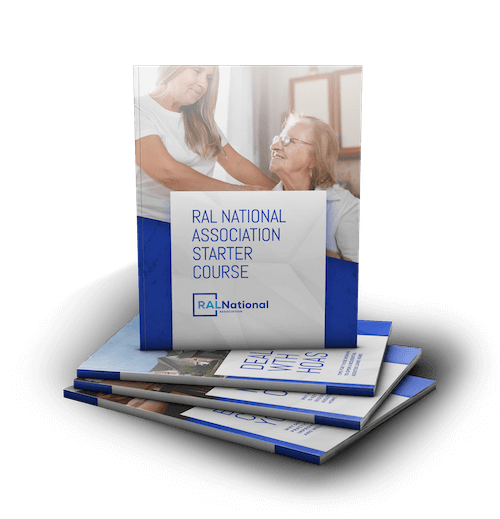One of the most important aspects of senior health and longevity in residential assisted living is fighting unnecessary inflammation. Creating a diet and lifestyle that promotes health and wellness marks the path to preventing chronic inflammation.
Inflammation poses many risks. Unfortunately, you can’t touch it, feel it or see it – this is how inflammation slowly damages the body unknowingly.
In summary, inflammation is swelling.
Usually swelling is the body’s natural way of healing itself from both infection and injury. Many seniors experience swelling for a completely different reason. It has nothing to do with disease.
As mom and dad age, the immune system can trigger a response without illness, injury or infection. As a result, cells that ordinarily protect the body start destroying healthy joints, organs and arteries.
The 3 most common reasons for this inflammatory response are:
- Eating unhealthy foods
- Limited exercise
- Excessive stress
Caregivers must be mindful of this condition in assisted living in order to provide quality care. Chronic inflammation can have damaging consequences over the long term.
THE DANGERS OF CHRONIC INFLAMMATION ON THE BODY
Here’s the tricky part – symptoms and signs of chronic inflammation are often difficult to detect, especially during the initial stages. Some seniors feel tired or fatigued, while others feel completely normal.
Either way, inflammation raises a red flag, because it will begin to damage arteries, organs and joints – this is serious.
Leading Consequences of Unchecked Chronic Inflammation
- Heart disease
- Heart attack/stroke
- Blood vessel disease
- Diabetes
- Obesity
- Cancer
- Alzheimer’s disease and other forms of dementia
Here’s what happens when the body is silently suffering from inflammation. The Immune system cells build up fatty deposits in the lining of the arteries.
These plaques can eventually rupture.
As a result, it causes a clot to form that has the potential to block an artery. Unfortunately, when this blockage occurs, many seniors experience heart attacks.
Three Common Ways to Test Inflammation Levels
- C-reactive protein (hs-CRP) blood test.
- Homocysteine test checks for a type of amino acid, a chemical your body uses to make proteins.
- HbA1C test to measure blood sugar and assess damage to red blood cells.
REDUCE THE RISK OF CHRONIC INFLAMMATION
What’s the good news that senior living businesses need to know about inflammation amongst seniors?
Inflammation can be controlled, reversed and sometimes even cured through simple diet and lifestyle changes.
It starts with talking to the residents’ doctor.
Reducing inflammation can be a process. The following professional tips will help caregivers support seniors on their journey to prevent or reduce inflammation in the body.
Five Tips to Reducing Inflammation
1. Prepare Proper Meals
Your food choices matter. They can protect against inflammation. Eat more fruits and vegetables and foods containing omega-3 fatty acids:
- Cold water fish
- Salmon
- Tuna
- Tofu
- Walnuts
- Flax seeds
- Soybeans
Other anti-inflammatory foods include:
- Grapes
- Apples
- Sweet potatoes
- Spinach
- Black beans
- Celery
- Blueberries
- Garlic
- Olive oil
- Tea
- Spices like ginger, rosemary and turmeric
An anti-inflammatory diet also limits foods that promote inflammation, including:
- Trans fats
- Saturated fats
- High levels of omega-6 fats (corn oil, grapeseed oil and peanut oil)
Let food become your anti-inflammation medicine.
Prepare whole foods in your residential assisted living home and minimize processed meals. Not only will eating anti-inflammatory food lower levels of inflammation, but it will also prevent diseases. Potassium-rich foods and low-sodium foods can also help regulate blood pressure.
Preparing proper meals is one of the most important steps any senior living home can take toward providing quality care.
2. Control Blood Sugar
If you can create healthy disciplines with crafty culinary skills to encourage seniors to avoid unhealthy foods altogether, do it. Most importantly, limit simple carbohydrates, such as white flour, white rice, refined sugar and anything with high fructose corn syrup.
3. Encourage Light Exercise
Regular exercise is an excellent way to prevent inflammation. Seniors who are able should walk or do 30 minutes of aerobic exercise at least 4 to 5 times per week.
4. Lose Weight
Losing weight is one of the easiest ways to decrease inflammation. When seniors are overweight, there is a higher risk of inflammation. This weight loss journey starts with proper diet and exercise.
5. Manage Stress
Chronic stress is a major contribution to inflammation. Change how seniors respond to stressful situations by building better relationships and making your assisted living home feel safe, warm and caring.
LONGEVITY IS GOOD FOR BUSINESS
When seniors in residential assisted living live longer, your home will stay occupied, which contributes to your bottom line. Providing quality care allows owners and operators to do good and do well.
The Residential Assisted Living National Association is a great resource for helping your business provide best practices.
At RALNA, industry leaders can get legal support, group discounts, useful blogs and so much more. Click to learn more about free memberships and quality senior care and wellness.
Wellness is more than a weight loss program, it’s a comprehensive effort to strengthen and preserve the entire person.











